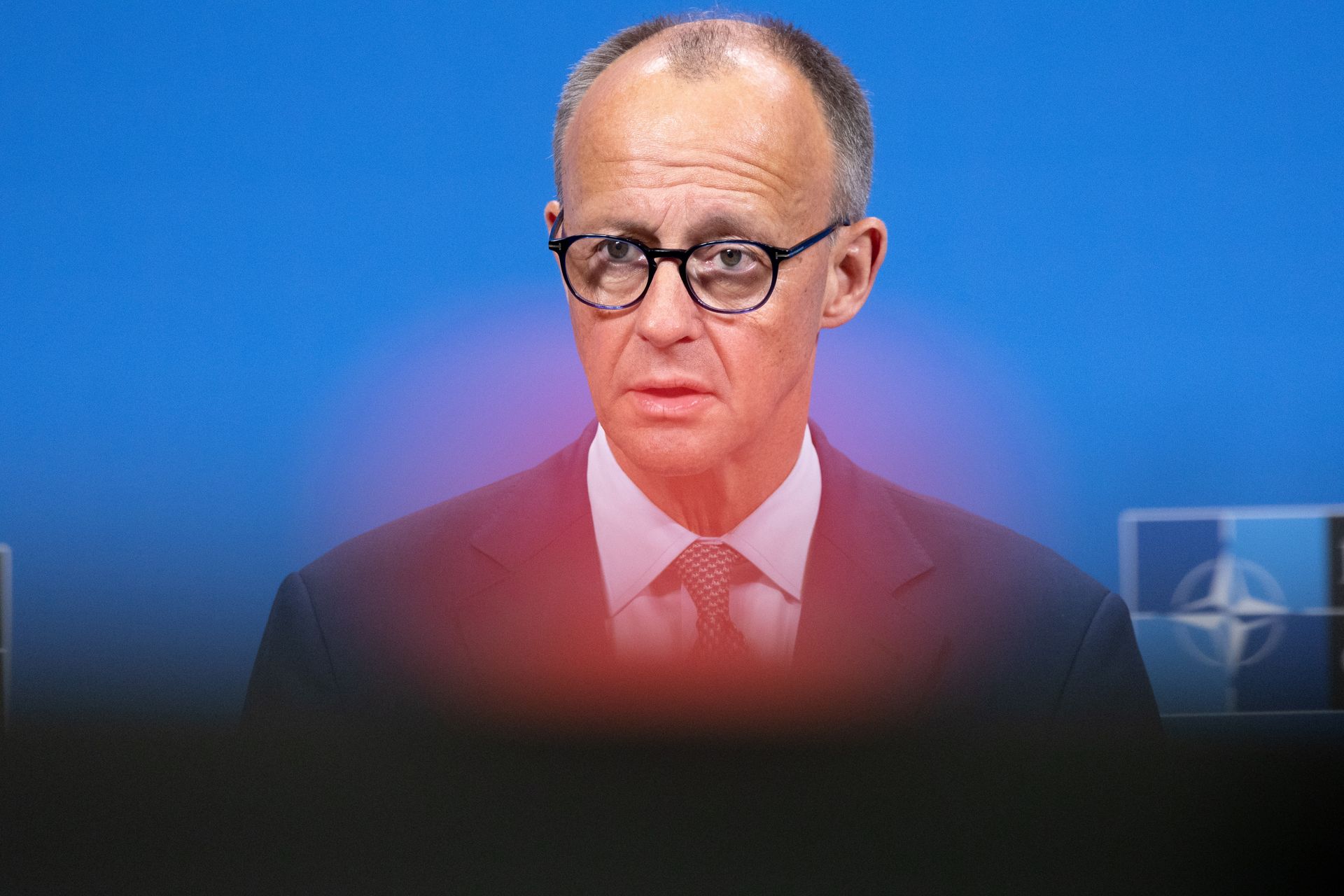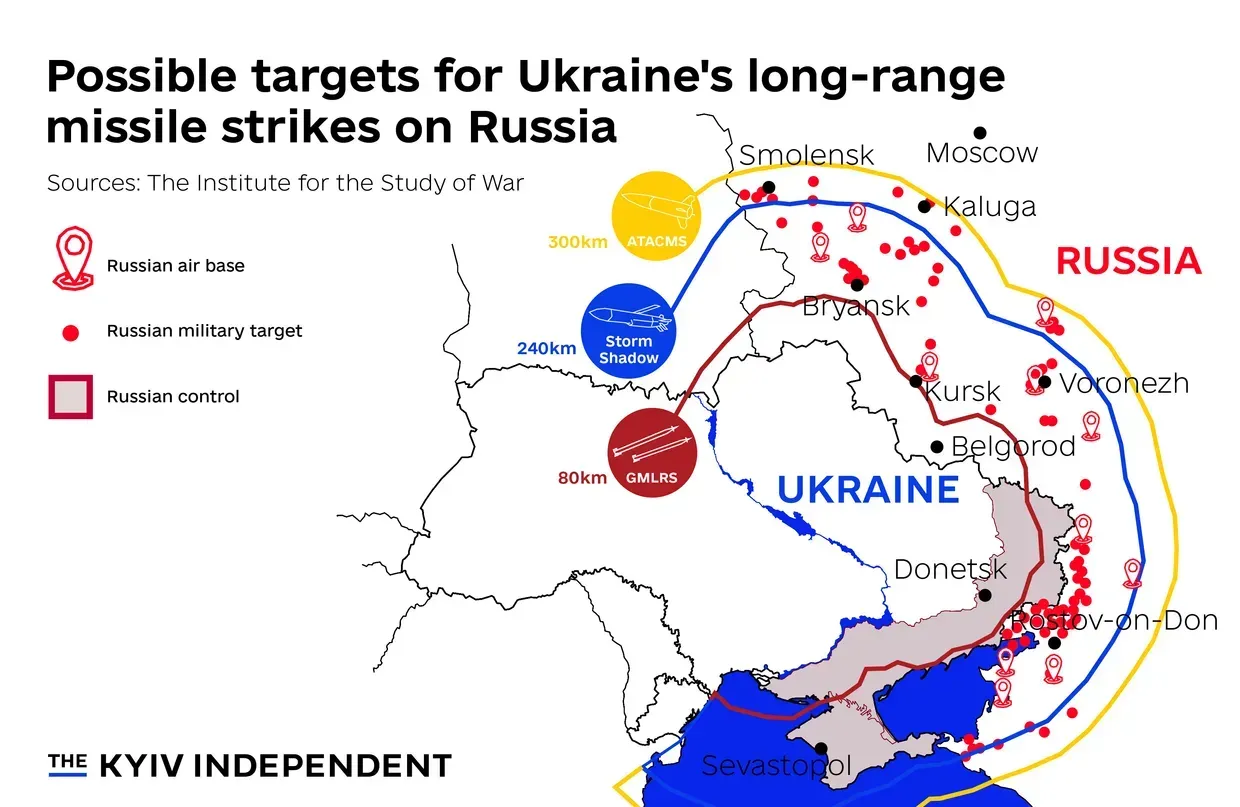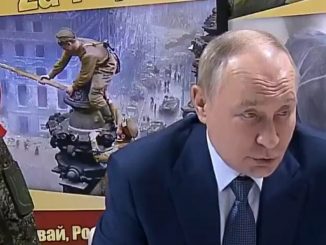
German Chancellor Friedrich Merz looks on as he takes part in a discussion on stage of the ‘Re:Publica 25’ fair ground during the opening of the ‘Re:publica 25’ digital conference in Berlin on May 26, 2025. ODD ANDERSEN / AFP
| Published May 27, 2025
The German chancellor said on Monday that the lifting of these restrictions will allow Ukraine to strike military positions in Russia and added that his government would strategically no longer detail what arms it is sending to Ukraine.

German Chancellor Friedrich Merz speaks during a press conference at the NATO headquarters in Brussels on May 09, 2025, in Brussels, Belgium. (Omar Havana / Getty Images)
German Chancellor Friedrich Merz announced the policy change on May 26, stating, “There are no longer any restrictions on the range of weapons delivered to Ukraine—neither by the U.K., France, nor us. There are no restrictions by the U.S. either.” This move follows Russia’s largest drone assault on Ukraine to date, involving over 355 drones in a single night, resulting in six deaths and 24 injuries.
The lifting of restrictions allows Ukraine to utilize long-range missiles, such as the U.K.’s Storm Shadow and potentially Germany’s Taurus, to strike targets deep within Russia. While Chancellor Merz has not confirmed the delivery of Taurus missiles, he emphasized the necessity of this policy shift in response to Russia’s continued aggression and the failure of diplomatic efforts.
The Kremlin has condemned the decision as “dangerous” and counterproductive to peace efforts, warning of severe consequences, including potential nuclear retaliation. Despite these threats, NATO has found no signals of nuclear escalation.
Ukrainian President Volodymyr Zelenskyy has welcomed the increased support, accusing Russia of politically motivated attacks and ordering an increase in domestic drone production. The policy change is seen as a collective response to escalating Russian aggression, with Western allies aiming to strengthen Ukraine’s defense capabilities.
 Possible targets for Ukraine’s long-range missile strikes on Russia (The Kyiv Independent)
Possible targets for Ukraine’s long-range missile strikes on Russia (The Kyiv Independent)
The lifting of range restrictions on Western weapons supplied to Ukraine has several far-reaching implications—militarily, diplomatically, and geopolitically:
1. Expanded Ukrainian Strike Capability
Ukraine can now legally use Western-supplied weapons to target military installations, supply routes, and command centers deep inside Russian territory. This could disrupt Russian logistics and morale but risks provoking a more aggressive Russian response.
2. Escalation Risks
Russia has already labeled the move “dangerous,” hinting at retaliation, including nuclear posturing. While NATO currently sees no nuclear threat, such rhetoric increases the risk of miscalculation or unintended escalation.
3. Unified Western Resolve
The coordination among Germany, the U.K., France, and the U.S. indicates a significant hardening of the Western stance. It signals that major NATO countries are now more willing to support offensive capabilities, not just defense.
4. Pressure on Other Allies
This policy shift could push countries like Italy, Spain, and others in the EU to reconsider their military aid policies. It may also influence neutral or undecided nations to pick sides more decisively.
5. Strain on Diplomacy
The removal of these limits makes future peace negotiations more complex. Russia may harden its stance, while Ukraine might feel emboldened to demand more concessions, potentially prolonging the conflict.
6. Kremlin’s Domestic Narrative
The Kremlin could use this shift to justify further military mobilization or crackdowns on dissent, framing the West as an existential threat now openly supporting attacks inside Russia.
7. Defense Industry Boost
Demand for long-range precision weapons—like Storm Shadows or potential Taurus missiles—will likely increase. Defense companies in Europe and the U.S. could see a surge in production and profits.
Overall Takeaway:
The West’s decision to lift range restrictions on weapons sent to Ukraine marks a pivotal escalation in the conflict, signaling a shift from cautious support to more assertive military backing. While it strengthens Ukraine’s hand against Russian aggression, it also heightens the risks of direct confrontation and complicates future diplomacy. This move reflects growing frustration with Russia’s unrelenting attacks and suggests the war may enter a more unpredictable and volatile phase.
SOURCES: NEWSMAX – Germany’s Merz: No Range Restrictions on Ukraine Weapons
LE MONDE – Germany’s Merz says Western allies no longer impose range limits on Ukrainian weapons
AP NEWS – Germany’s Merz says there are no more range restrictions on the weapons supplied to Ukraine
THE KYIV INDEPENDENT – West no longer imposing range restrictions on arms for Ukraine, Germany’s Merz says





Be the first to comment